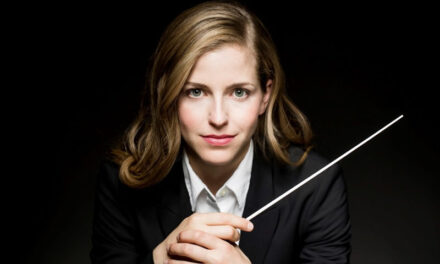It was surely no coincidence that the Opera Company of North Carolina chose to produce Giaocchino Rossini’s comic opera La Cenerentola, ossia la banta in trionfo (Cinderella, or Goodness Triumphant) on Valentine’s Day. This grand entertainment, first produced in Rome in January 1817, obviously was an event that many people in our community considered a perfect way to spend the last few hours of a day celebrating romantic love, for Fletcher Opera Theater was host to a standing-room-only audience very ready to be entertained.
La Cenerentola, like several other operas composed during the early years of the 19th century, is a retelling of the beloved Charles Perrault fairy tale about a poor, motherless young girl of spotless virtue whose only purpose in life is to wait upon her cruel, ugly stepsisters, with no thought to her own happiness, and whose willingness to serve them without complaint is rewarded when she becomes the bride of a handsome prince who whisks her away from poverty and abuse. Rossini’s heroine, like many another Cinderella, represents the fondly-held belief expressed in the subtitle. But Rossini presents a somewhat darker, or perhaps more realistic, side of the tale: that virtue has a hard time in a world too often controlled by motives of selfishness and cruelty.
Even the presence of this dark side, however, cannot prevent audiences from appreciating the brilliant music, excellent singing of a fine ensemble cast, and superb comic acting which Rossini’s great opera demands. As in all his operas, La Cenerentola exemplifies the Rossinian insistence that singers possess all the hallmarks of bel canto vocalism: to ability to spin long coloratura lines, great power and fluidity, incredibly wide ranges, and ringing high notes— in all voices. The stunning coloratura, especially in tenors and basses, is the element of this style that still surprises and delights audiences today as it did two centuries ago.
The ugly stepsisters, Tisbe (mezzo-soprano Julia Tobiska) and Clorinda (soprano Danielle Pecone), exemplified Rossini bel canto from the beginning to the end of the opera. In the title role, mezzo-soprano Priti Gandhi used her powerful, warm voice, with its tonal beauty and great fluidity, to sing a variety of music revealing her three-dimensional character of meekness, strength and gentleness. Her first music, an unadorned minor-key folk song portraying a king who takes a bride not for her wealth and power but for her simple goodness, suggests plaintively the way she feels about her position in life and her dream of finding such a man in her future. Her greatest vocal showpiece, with its many coloratura passages, occurs in the second-act finale, during which she voices the pathos of her previous life and her triumph in finding love and honor at last.
Prince Ramiro (tenor Brian Stucki) and his valet Dandini (baritone Andrew Garland) often dominated the stage with their magnificent singing, both lyric and dramatic, replete with brilliant coloratura made possible by great vocal fluidity, smooth blending of registers, and effortless high notes produced by well-developed head voices. Stucki’s grand singing is true to the character of a noble prince, and that of Garland is a fine representation of a subtle fellow who obviously enjoys disguising himself as his master. Stucki demonstrated his vocal skills in his first entrance in Act I when, disguised as his valet Dandini, he first meets Cenerentola and sings a tender duet with her that indicates the mutual attraction between him and the girl that he does not yet know he will choose as his bride. His Act II, scene ii, duet with Cenerentola allowed him to reveal his true identity in a show of vocal skill marked by lyricism and stunning high notes. Garland’s skills also appeared in a duet with Cenerentola (when he had to admit to her that he was not the Prince but his servant) as well as in a duet with the Prince (when both exchanged thoughts about the family of Don Magnifico and his unattractive daughters).
Don Magnifico (bass-baritone Stefano de Peppo) is a scene stealer with his many skillful buffo utterances and his left-footed comic behavior, both of which excite frequent audience laughter, but like other Rossini characters in this opera he is not always what he seems. His comic behavior with his two daughters suggests a man of limited intelligence who drinks too much and is not capable of much guile, but in reality he is a man of subtle machinations and cruelty. De Peppo’s great vocal skill made his buffo patter believable throughout out the opera, but he also brought out the Don’s darker personality in Act I, when he told Dandini the cruel lie that his third daughter (Cenerentola) was dead, so that none of the Prince’s company would insist that she go with her stepsisters to court. The same voice that elicited audience laughter was clearly capable of conveying the innate meanness of the man.
There is much more to admire in this excellent production, especially the admirable singing of bass Branch Fields as the philosopher Alidoro, who knows all the important details that not even his master the Prince and his valet know; the intriguing ensemble numbers in the two grand finales, which never fail to reveal many details of the dramatic irony that moves the action forward; the absurdly funny balletic poses taken by the stepsisters to reveal their supposed beauty; the magnificent acting by everyone in the cast; and the good singing of the chorus of young men accompanying the Prince. I must also acknowledge the excellent staging and costumes, the direction of James Marvel, who obviously knows his Rossini very well, and the masterful efforts of Timothy Myers, Principal Conductor, whose sure preparation of the orchestra and keen eye for the support he needed to give the singers made the production of La Cenerentola a wonderful Valentine’s Day experience.
La Cenerentola resumes in the Fletcher Opera Theater on February 20-21. For details, see our Triangle calendar.











